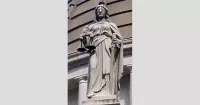Luxembourg, officially the Grand Duchy of Luxembourg, is a landlocked Western European nation bordering Belgium, Germany, and France. Luxembourg City, its capital, is a key EU center, hosting institutions like the Court of Justice of the European Union. It is a small but significant player in European politics and economics.
November 1918: Motion to abolish monarchy defeated
In November 1918, a motion in the Chamber of Deputies demanding the abolition of the monarchy was narrowly defeated.
January 1919: Luxembourg Army Rebellion
In January 1919, a company of the Luxembourgish Army rebelled, declaring itself to be the army of the new republic, but French troops intervened. Marie-Adélaïde abdicated in favour of her sister Charlotte 5 days later.
1919: Sovereignty Resides with the Nation
Since 1919, sovereignty has resided with the nation, exercised by the grand duke in accordance with the Constitution and the law.
1921: Belgium-Luxembourg Economic Union
In 1921, Luxembourg and Belgium formed the Belgium–Luxembourg Economic Union (BLEU) to create a regime of inter-exchangeable currency and a common customs.
May 9, 1940: Schuster line closed
On May 9, 1940 Luxembourg closed the defensive Schuster line with Germany.
1945: United Nations Founding Member
In 1945, the Grand Duchy became a founding member of the United Nations.
1948: End of Neutrality
In 1948, Luxembourg's neutral status under the constitution formally ended.
1952: Luxembourg wins Olympic gold
In 1952, Josy Barthel won the 1500 metres and Luxembourg won its first gold medal at the Summer Olympics in Helsinki.
1952: European Coal and Steel Community
In 1952, Luxembourg became one of the six founding countries of the European Communities, following the establishment of the European Coal and Steel Community.
1956: First Eurovision Participation
Luxembourg was a founding participant of the Eurovision Song Contest in 1956.
1958: Creation of European Communities
In 1958, Luxembourg was a founding country for the creations of the European Economic Community and European Atomic Energy Community.
1959: Missed Eurovision Participation
Luxembourg did not participate in the Eurovision Song Contest in 1959.
1973: Fourth Eurovision Win and Host
Luxembourg won the Eurovision Song Contest in 1973 and hosted the contest.
1980: Statistics on Religion
Since 1980, it has been illegal for the government to collect statistics on religious beliefs or practices.
1984: Language Regimen Act
As determined by the 1984 Language Regimen Act, Luxembourgish is the sole national language of the Luxembourgish people.
1984: Language Use in Administration
Per article 4 of the law promulgated in 1984, if a citizen asks a question in Luxembourgish, German or French, the administration must reply, as far as possible, in the language in which the question was asked.
1988: Tax Scheme for Audiovisual Investment
Due to a 1988 law that established a special tax scheme for audiovisual investment, the film and co-production in Luxembourg has grown steadily.
1993: Incorporation into the European Union
In 1993, the European Economic Community and European Atomic Energy Community were incorporated into the European Union.
1993: Relegation from Eurovision
Luxembourg was relegated after the 1993 Eurovision competition.
1994: UNESCO World Heritage Site
In 1994, the historic city of Luxembourg was declared a UNESCO World Heritage Site due to its well-preserved fortifications and historic quarters.
1995: Did not return to Eurovision Song Contest
Although Luxembourg was free to participate again in 1995, it chose not to return to the Eurovision Song Contest before 2024.
1995: European Capital of Culture
Luxembourg was the first city to be named European Capital of Culture in 1995.
1999: Joined the Eurozone
In 1999, Luxembourg joined the eurozone.
1999: Estimated Illegal Immigrants
There were an estimated 5,000 illegal immigrants in Luxembourg in 1999.
2000: CIA Factbook Estimate
A 2000 estimate by the CIA Factbook is that 87% of Luxembourgers are Catholic, including the grand ducal family, with the remaining 13% being Protestants, Orthodox Christians, Jews, Muslims, and those of other or no religion.
2000: Immigrant Population
In 2000, there were 162,000 immigrants in Luxembourg, accounting for 37% of the total population.
2005: Eurobarometer Poll Results
According to a 2005 Eurobarometer poll, 44% of Luxembourg citizens responded that "they believe there is a God", whereas 28% answered that "they believe there is some sort of spirit or life force", and 22% that "they do not believe there is any sort of spirit, god, or life force".
2007: Women's European Volleyball Championship
The final of the 2007 Women's European Volleyball Championship took place at d'Coque, Kirchberg, north-eastern Luxembourg City.
2008: New Passenger Terminal at Luxembourg Airport
In 2008, a new passenger terminal at Luxembourg Airport was opened.
April 2009: G20 "Gray List"
In April 2009, concern about Luxembourg's banking secrecy laws led to its being added to a "gray list" of nations with questionable banking arrangements by the G20.
2009: Global Broadband Quality Study Ranking
In 2009, Luxembourg was ranked 8th in the Global Broadband Quality Study by the University of Oxford and the University of Oviedo.
March 2010: Kim Jong Il Accounts
In March 2010, the Sunday Telegraph reported that most of Kim Jong Il's $4 billion in secret accounts was in Luxembourg banks.
October 2010: World Expo in Shanghai
Luxembourg was represented at the World Expo 2010 in Shanghai, China, from 1 May to 31 October 2010 with its own pavilion, designed as a forest and fortress.
2010: Pew Research Center Study
According to a 2010 Pew Research Center study, 70.4% are Christian, 2.3% Muslim, 26.8% unaffiliated, and 0.5% other religions in Luxembourg.
2010: High Healthcare Spending
According to data from the World Health Organization, healthcare spending on behalf of the government of Luxembourg topped $4.1 Billion in 2010, amounting to about $8,182 for each citizen in the nation.
2010: Agriculture Statistics
In 2010, agriculture employed about 2.1% of Luxembourg's active population, with 2,200 agricultural holdings averaging 60 hectares.
2010: National strategy for very high-speed networks launched
In 2010, the Luxembourg Government launched its National strategy for very high-speed networks with the aim to become a global leader in terms of very high-speed broadband by achieving full 1 Gbit/s coverage of the country by 2020.
2011: NGA Coverage Reached 75%
In 2011, Luxembourg had an NGA (Next Generation Access) coverage of 75% across the country.
2011: Financial Secrecy Index Ranking
In 2011, Luxembourg ranked third on the Tax Justice Network's Financial Secrecy Index.
2011: World's Second Richest Country
In 2011, according to the IMF, Luxembourg was the world's second-richest country, with a per capita GDP on a purchasing-power parity (PPP) basis of $80,119.
2011: Paquet Telecom
In 2011, the telecommunications industry in Luxembourg adopted the legislative framework Paquet Telecom of the Government which transposes the European Telecom Directives into Luxembourgish law.
April 2012: Amazon.co.uk Tax Loopholes
In April 2012, The Guardian reported that Amazon.co.uk benefits from Luxembourg tax loopholes.
May 2012: Unemployment Rate
By May 2012, Luxembourg's unemployment rate reached 6.1% after the Great Recession.
December 2012: Data centers ranked among top positions
In December 2012, a survey measuring availability and performance of nine international data centers showed that the top three positions were held by Luxembourg data centers.
2012: Environmental Performance Index Ranking
According to the 2012 Environmental Performance Index, Luxembourg ranked fourth out of 132 assessed countries.
2012: Native languages spoken
In 2012, 52% of citizens claimed Luxembourgish as their native language, 16.4% Portuguese, 16% French, 2% German and 13.6% different languages (mostly English, Italian or Spanish).
January 2013: Data centers ranked among top positions
In January 2013, a survey measuring availability and performance of nine international data centers showed that the top three positions were held by Luxembourg data centers.
April 2013: Sixth Highest Download Speed Worldwide
In April 2013, Luxembourg had the sixth highest download speed worldwide and the second highest in Europe with 32.46 Mbit/s.
2013: United Nations Security Council
In 2013, Luxembourg served on the United Nations Security Council for the first time.
2013: UN Security Council Member
In 2013, Luxembourg was elected non-permanent member of the United Nations Security Council.
2013: Safest Tax Haven
In 2013, Luxembourg was ranked the second safest tax haven in the world, behind Switzerland.
2013: Immigrant Population
In 2013, about 88,000 Luxembourg inhabitants possessed Portuguese nationality. In 2013, there were 537,039 permanent residents, 44.5% of which were of foreign background or foreign nationals.
November 2014: Luxembourg Leaks
In November 2014, Jean-Claude Juncker was hit by media disclosures from Luxembourg Leaks, revealing that Luxembourg had become a major European center of corporate tax avoidance under his premiership.
2014: Luxembourg School of Business Creation
In 2014, Luxembourg School of Business, a graduate business school, was created through private initiative.
2014: United Nations Security Council
In 2014, Luxembourg continued to serve on the United Nations Security Council.
2014: Oscar Win
Luxembourg won an Oscar in 2014 in the Animated Short Films category with Mr Hublot.
May 2015: Holdings of U.S. Treasury Securities
In May 2015, Luxembourg ranked 11th in the world in holdings of U.S. Treasury securities, totaling $171 billion.
December 2017: Reintroduction of Trams
In December 2017, Luxembourg City reintroduced trams.
2017: Luxembourg School of Business Accreditation
Luxembourg School of Business received the accreditation from the Ministry of Higher Education and Research of Luxembourg in 2017.
2018: Multilingual Population
As of 2018, 80% of citizens reported being able to hold a conversation in English, 78% in German and 77% in Luxembourgish.
2019: Public Debt
As of 2019, Luxembourg's public debt totalled $15,687,000,000, or $25,554 per capita. The debt to GDP was 22.10%.
2019: Forest Landscape Integrity Index
Luxembourg had a 2019 Forest Landscape Integrity Index mean score of 1.12/10, ranking it 164th globally out of 172 countries.
February 2020: Free Public Transportation
On 29 February 2020, Luxembourg became the first country to introduce no-charge public transportation, which is almost completely funded by public taxation.
2020: Aim to achieve full 1 Gbit/s coverage
By 2020, the Luxembourg Government aimed to achieve full 1 Gbit/s coverage of the country as part of its National strategy for very high-speed networks.
2020: Free Public Transport
In 2020, Luxembourg became the first country in the world to provide free public transport at a national scale.
2020: Environmental Performance Index Ranking
In 2020, Luxembourg ranked second out of 180 countries in Environmental Performance.
2021: French Spoken Widely
In 2021, 98% of citizens were able to speak French to a high level.
July 2023: Constitution updated
On 1 July 2023, The Constitution of Luxembourg, the supreme law of Luxembourg, was last updated.
2023: 6th highest health index in Europe
Luxembourg ranked 6th place in highest health index of countries in Europe in 2023.
January 2024: Investment Tax Credit Law Takes Effect
On January 1, 2024, Luxembourg's law to modernize the current investment tax credit, adopted in December 2023, took effect.
2024: Luxembourg's Population
In 2024, Luxembourg had a population of 672,050, making it one of the least-populated countries in Europe, but with the highest population growth rate.
2024: Environmental Performance Index
In 2024, Luxembourg is ranked 2nd in Environmental Performance Index globally.
2024: Return to Eurovision Song Contest
Luxembourg chose to return to the Eurovision Song Contest in 2024 with a particular emphasis on promoting music and artists from Luxembourg.
2024: Global Innovation Index
Luxembourg ranked 20th in the Global Innovation Index in 2024.
2030: Emission reduction goal
Luxembourg's climate law sets a goal that by 2030 it would have reduced emission down to 55%.
2050: Zero Emissions Target
Luxembourg aims to reach zero emissions by 2050.
Mentioned in this timeline
The Guardian is a British daily newspaper founded in as...
Germany officially the Federal Republic of Germany is a nation...
China officially the People's Republic of China is an East...
France officially the French Republic is primarily located in Western...

War is defined as an armed conflict involving the armed...

Justice in its broadest sense is the concept of treating...
Trending

21 minutes ago Cameron Boozer: Duke Forward, Elite Numbers, and Wooden Award Favorite

22 minutes ago Josiah Harrell's Sensational UFC Debut After Rare Brain Disease Diagnosis: A Houston Story

22 minutes ago Rajah Caruth shines at JR Motorsports; Mayer takes pole; Mears avoids crash.

23 minutes ago Anthony Black scores 20 points in Magic's Thursday's victory, Desmond Bane contributes.

23 minutes ago Yaxel Lendeborg's life story, Michigan rise, and draft prospects are revealed.
1 hour ago Alabama Basketball Faces LSU: A Crucial Road Matchup and Maturity Test Looms
Popular

Jesse Jackson is an American civil rights activist politician and...

Barack Obama the th U S President - was the...

Ken Paxton is an American politician and lawyer serving as...

Bernie Sanders is a prominent American politician currently serving as...
Randall Adam Fine is an American politician a Republican who...

Michael Joseph Jackson the King of Pop was a highly...